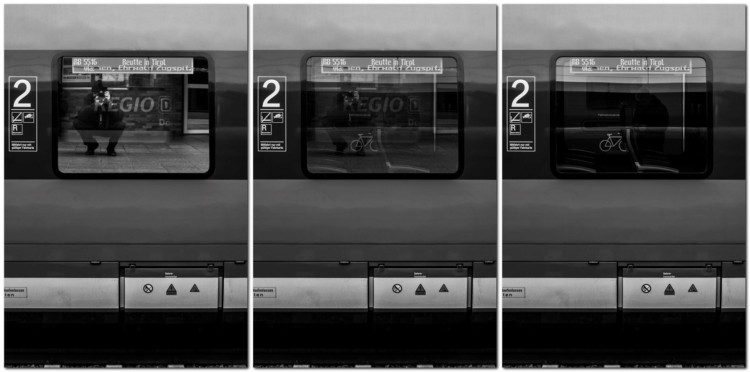from Body Boundaries by Maria Schiza
(responding to photographs by Tassos Schizas)
~
ii

You have come to know this city as a balancing gesture:
layers of history plus more lives than such a stretch of soil can comfortably carry.
The arrival of the moment when day slips into night, like curtains drawn shut with a certain movement of the wrist. A concert of lights. Flickering alight with a quiet crackling. Staying stubbornly on.
Car horns echoing across the street. Footsteps landing on the concrete.
This is a dirty pavement, cracked in places, covered in pigeon shit, chewing gum, flakes of dirt. It is beautiful despite itself, especially in twilight or in the middle of the night.
If you leave this disappearing act aside for a while, if you go and stand at the top of this sequence of eons, right next to the crumbling pillars of the agora, and raise yourself on your tiptoes, as if to offer your mouth for a kiss, you can just see the sea.
The water is black as it disappears into the sky. During these hours, it simply exists to murmur its own sounds softly and to reflect back everything that comes too close.
iv

Pick a point. Pick a second one. Or more. Points in space, not time. At this point in time, chronology is not a matter of choice. Movement means going from one point to another. Irrespective of how. Sometimes also a reversal, a return, a backtracking. Sometimes not. One-way tickets have their own ontology.
Take a red pin. Press it in a map with your right thumb. Watch it sink in place.
The sink in this place has a dripping faucet;
the tapping of droplets accompanies your thoughts.
What are you thinking of?
Of the movement between places, which could also be a place. Of your reflection on a train window and the race between you, the race to see which one will disappear first. Of crouching down to catch your reflection. Of how a crouch is close to kneeling, close to prayer, only worlds apart.
Nod your head for no.
This train will go whether you board it or not.
It will start slowly and then gain speed and then it will not be here anymore.
You will also go. Maybe carried by this train or maybe in a different direction.
Maybe carried by your own two feet.
Soon enough, both of you will have moved.
v

what have I come to carry
inside myself
outside the opaque exterior
of my suitcase
towards this unknown city
every launch
a fade in
or a fade out
perfect harmony
comes in sets of three:
the fingers of my right hand
resting around a pen
the mellow green of the meadows
rolling outside the separating surface
of the window pane
the presence of the place
in which I have not yet arrived
which has not come into view
which has not become reality
but which, I hope,
will be kind
kinder than the places
that have come before
what have I come to carry
inside myself
outside the opaque exterior
of my suitcase
towards this unknown city
every launch
a fade in
or a fade out
perfect harmony
comes in sets of three:
the fingers of my right hand
resting around a pen
the mellow green of the meadows
rolling outside the separating surface
of the window pane
the presence of the place
in which I have not yet arrived
which has not come into view
which has not become reality
but which, I hope,
will be kind
kinder than the places
that have come before
vii

staring up into the light
calls for bending the back of your neck
to make eye contact with that
which blinds you
absence starts at cell level
and moves outwards
morph your spine into the chair
one vertebra at a time
release the tension from your shoulders,
your jaw, the backs of your hands
this space was made into
the shape of a home
long before you came along
and it will settle back
into rippleless calm
after you are gone
staring up into the light
calls for bending the back of your neck
to make eye contact with that
which blinds you
absence starts at cell level
and moves outwards
morph your spine into the chair
one vertebra at a time
release the tension from your shoulders,
your jaw, the backs of your hands
this space was made into
the shape of a home
long before you came along
and it will settle back
into rippleless calm
after you are gone
viii

How would you describe the sound of a rope unraveling?
The things that hold your body weight are not always visible.
A chair would crack a warning.
This rope might creak, a muttering of uncertainty.
Your muscles might shake before a collapse.
The things that stand quietly often go without a noise.
If you lean your elbows on your knees, allow your head to drop,
and close your eyes, what is it that you see?
You have collected all of your loses and brought them in this room,
tidied them up in rows against the walls,
marked them with labels made of grief.
You point the lens at them, one emptiness at a time.
When you develop the negatives, only some of them show up.
It is only fair.
~
Maria Schiza is a freelance writer and translator from Thessaloniki, Greece. She has graduated with a master’s degree in Creative Writing from the University of Nottingham and is currently a PhD student at the University of Edinburgh, studying ekphrastic poetry. Her work has previously appeared in Persephone’s Daughters, on the website of Harvard’s Center for Hellenic Studies, in Voices, and others.
About Tassos Schizas: The photographs these poems respond to are part of Tassos Schizas’s “Johatsu/Ανάμεσα” series. More of his work can be found here.
